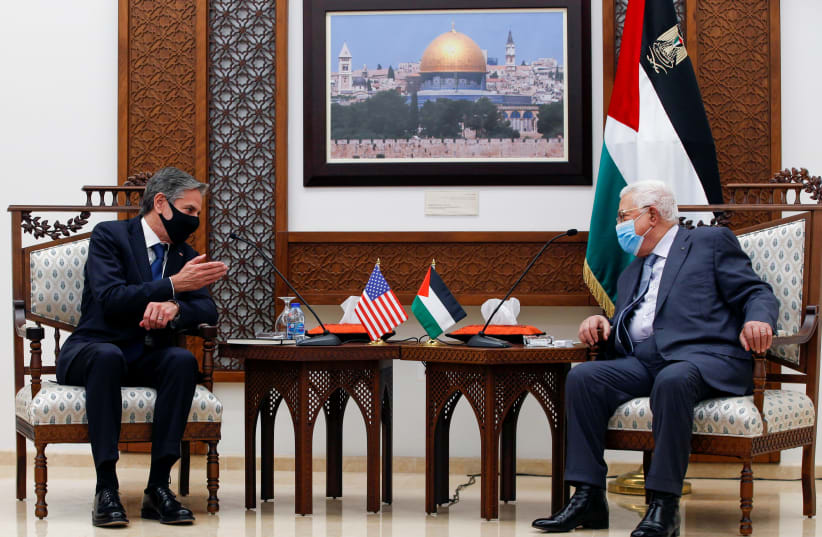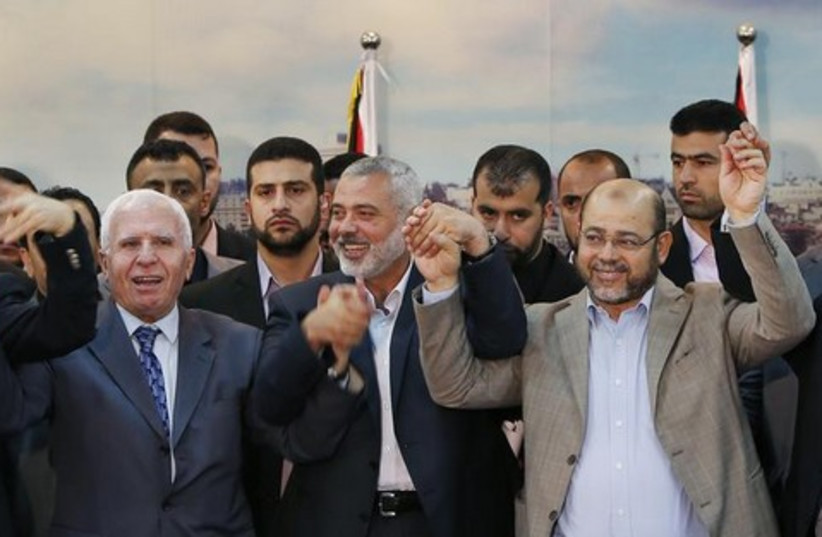The Palestinians are opposed to a return to the peace negotiations with Israel under the leadership of the United States, senior Palestinian official Azzam al-Ahmed said Thursday.
The Palestinians are also opposed to any US policy that envisages the management of the conflict as a substitute for solutions, he said ahead of Prime Minister Naftali Bennett’s meeting with US President Joe Biden in the White House.
“The Palestinians will not accept a situation where the US alone is in charge of the peace process in the Middle East,” Ahmed said in an interview on the Palestinian Authority’s Palestine TV.
The Palestinians, he said, insist that any future peace talks with Israel be held on the basis of PA President Mahmoud Abbas’s initiative for convening an international peace conference with the participation of various parties, including the Quartet (the US, the European Union, Russia and the United Nations), Jordan, Egypt, South Africa and China.
“We will not agree under any circumstances to a policy of managing the conflict,” Ahmed said.
Abbas made his initiative last year when he called on UN Secretary-General Antonio Guterres to convene an international conference in early 2021 to launch “a genuine peace process” with Israel. Abbas urged Guterres to work with the Quartet and the UN Security Council on a conference “with full authority and with the participation of all concerned parties.”
The Palestinian issue was on the agenda of Bennett’s talks with Biden administration officials, Ahmed said.
“According to information we received, the Americans told Bennett: ‘No, we are not going to discuss with you the Iranian issue only. We want to discuss the Palestinian issue. Therefore, you must bring with you something on this,’” he said.
Bennett’s statements to The New York Times on the eve of his visit to the White House, in which he said there would be no Palestinian state and that “natural growth” in the settlements would continue, came in response to the request from the Biden administration to include the Palestinian issue in the discussions, Ahmed said.
On the eve of Bennett’s visit to Washington, the Fatah Central Committee, a key decision-making body, held a meeting in Ramallah to discuss the latest developments related to the Israeli-Palestinian conflict. Abbas, who also heads Fatah, chaired the meeting.
Abbas told the Fatah officials that Palestinians were not expecting anything from the Biden-Bennett meeting, Ahmed said.
“But, President Abbas said we will give the US administration a number of days to clarify matters,” he said. “The US administration is talking about the two-state solution, while Bennett is saying there will be no two-state solution. The US administration must exert real pressure on Israel. In fact, the US is the one that has always been making decisions since 1956. They told Israel to withdraw from Sinai and the Gaza Strip, and Israel complied.”
Ahmed revealed that a tripartite Palestinian-Jordanian-Egyptian summit would be held soon to coordinate positions ahead of Abbas’s address to the UN General Assembly next month. Contacts were underway to hold an Arab summit to discuss the Israeli-Palestinian conflict, he said.
The PA Ministry of Foreign Affairs, meanwhile, said Biden and Secretary of State Anthony Blinken have an opportunity “to stop Israeli Prime Minister Naftali Bennett’s colonial project.”
In a statement shortly before the Bennett-Biden meeting, the ministry said the US administration “must restrain Bennett and convince him of the truth that he, as an occupation officer, refuses to see.”
Addressing the Biden administration, the ministry asked: “Is there an American vision that forces Bennett to stop his anti-peace colonial project?”

